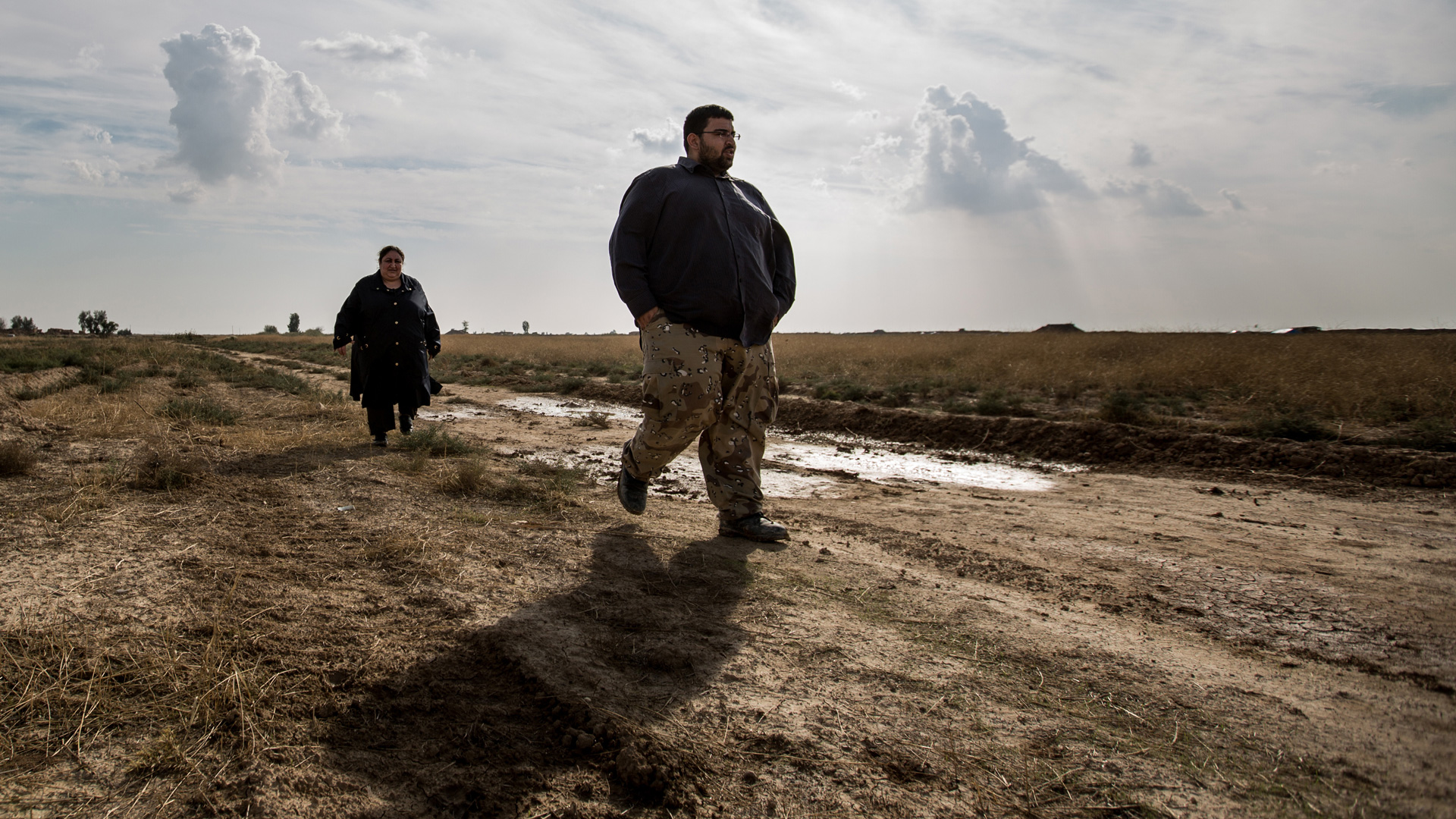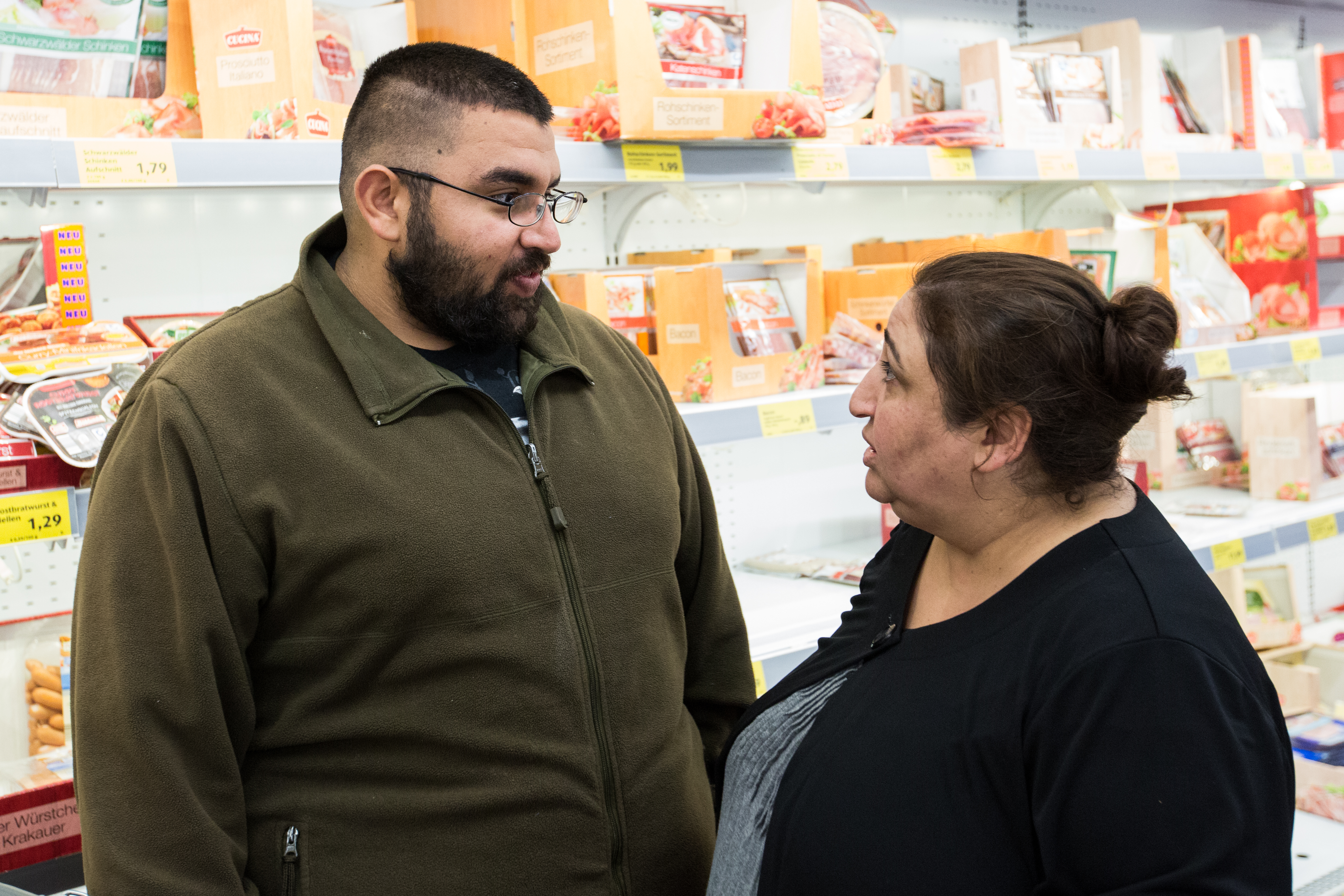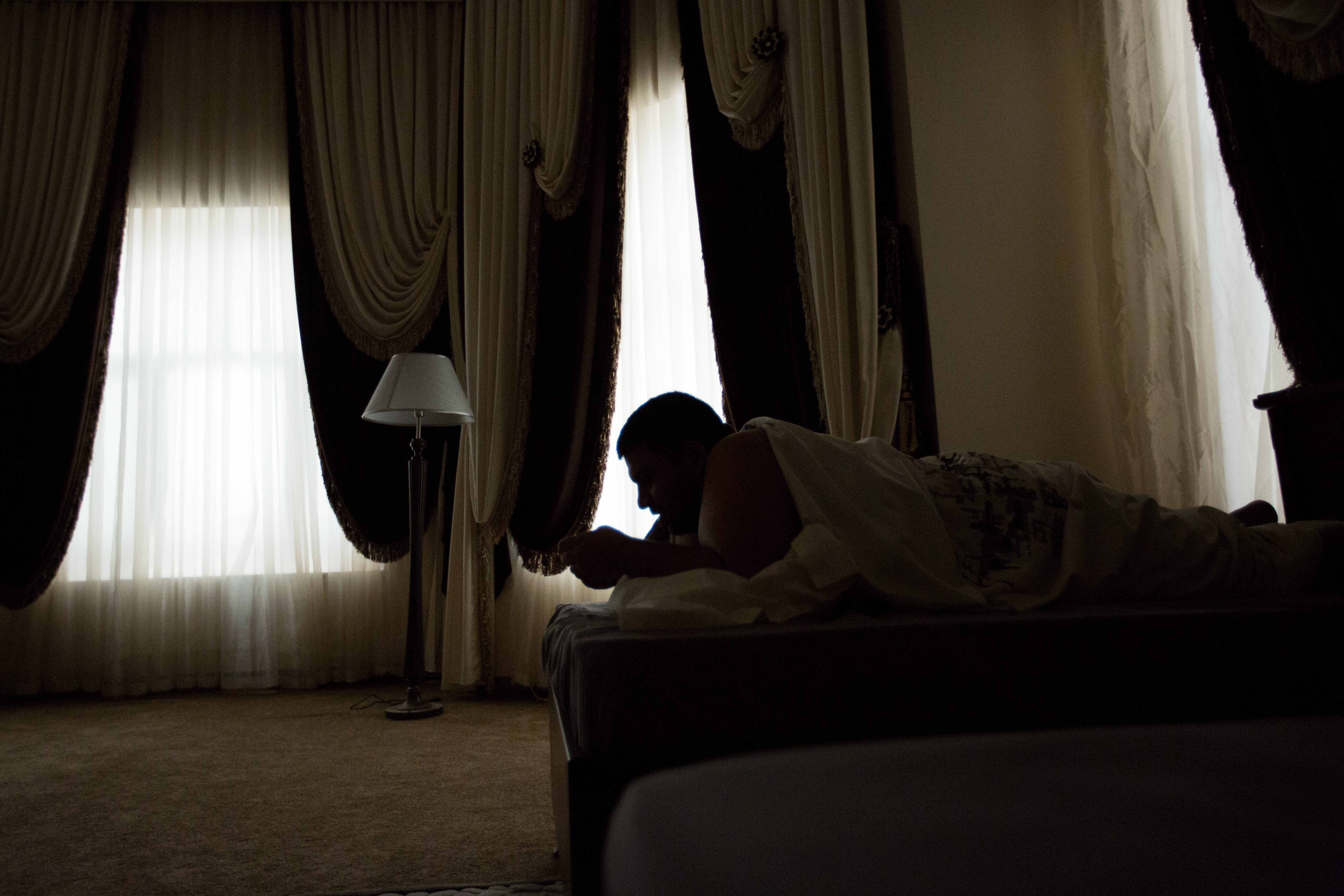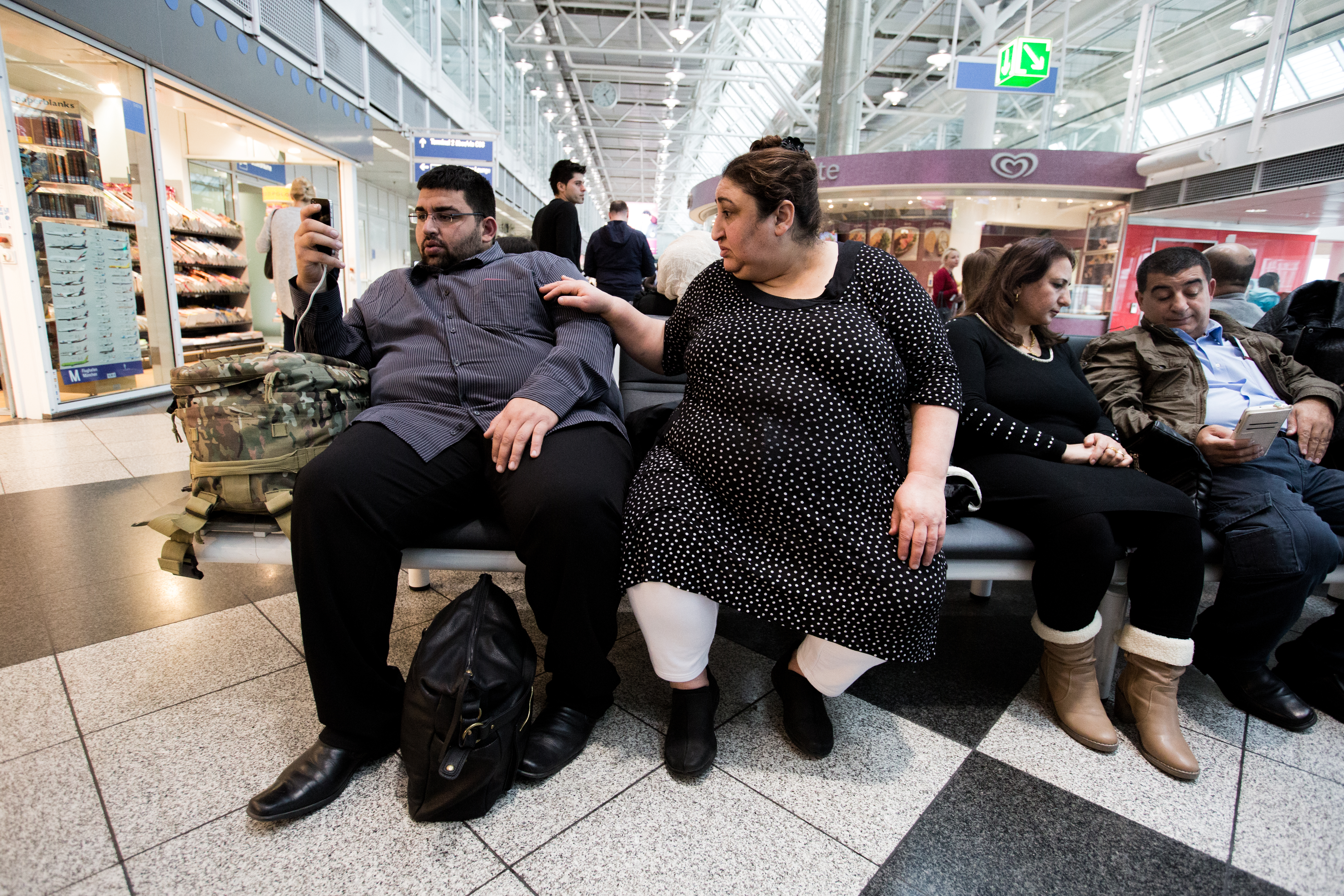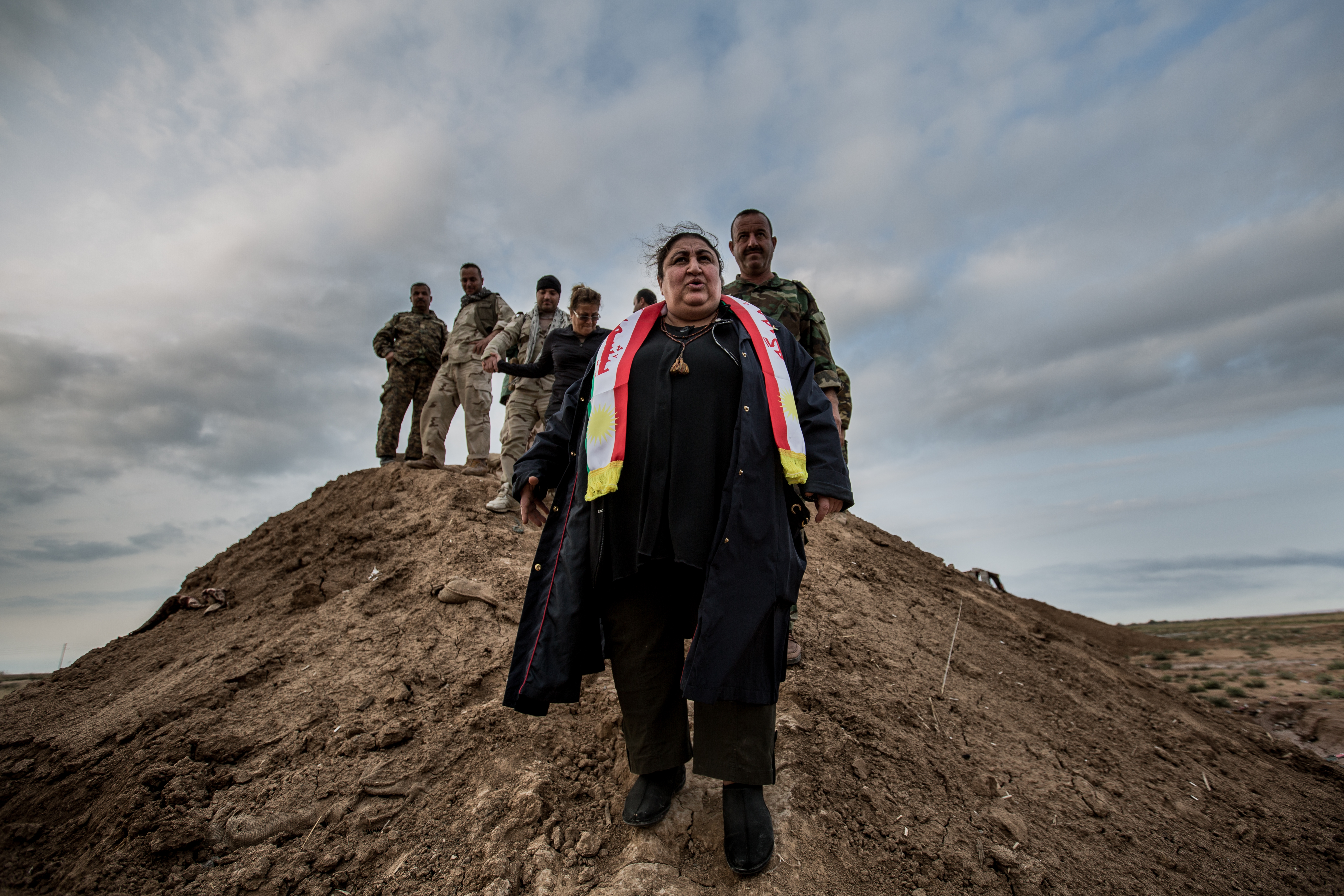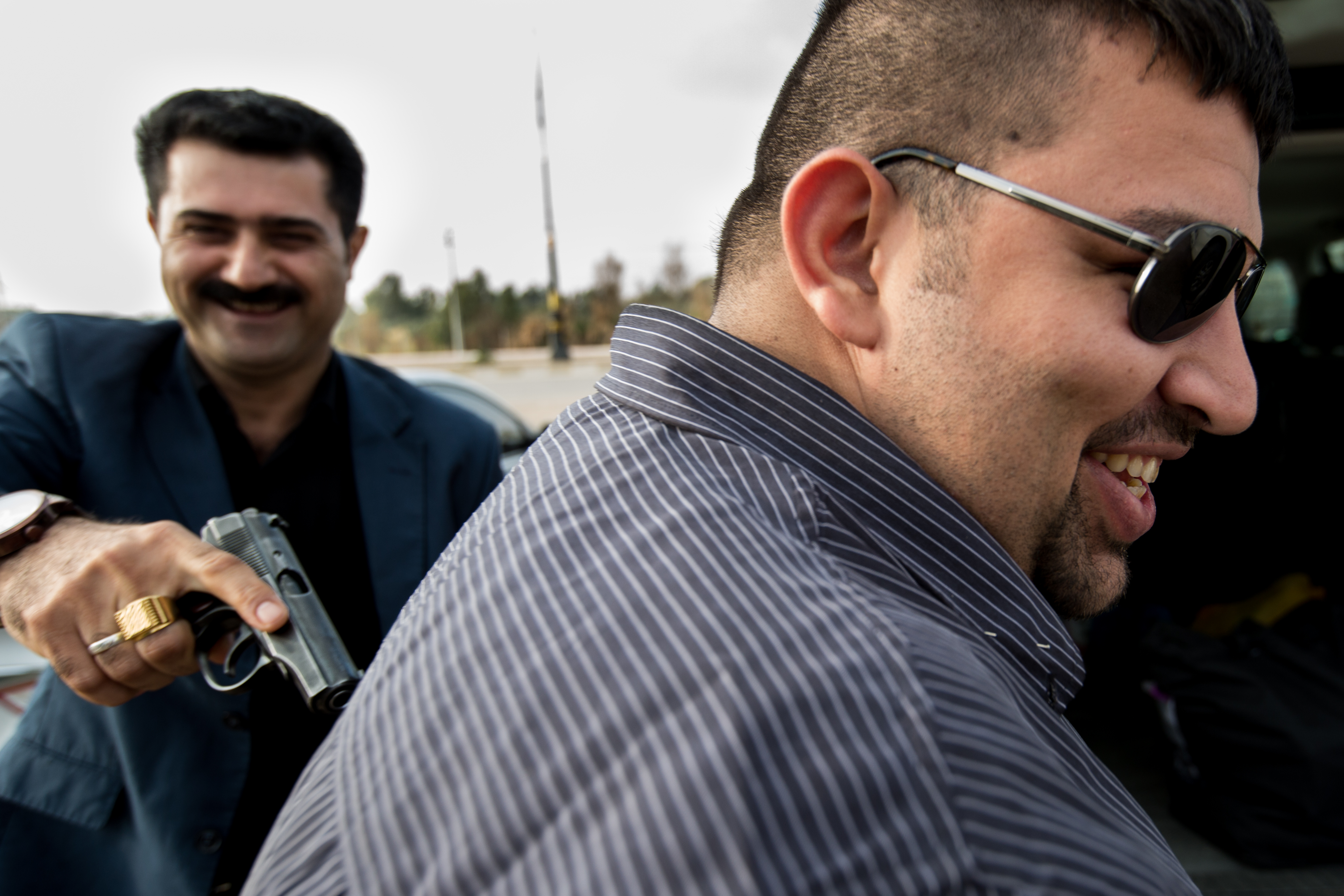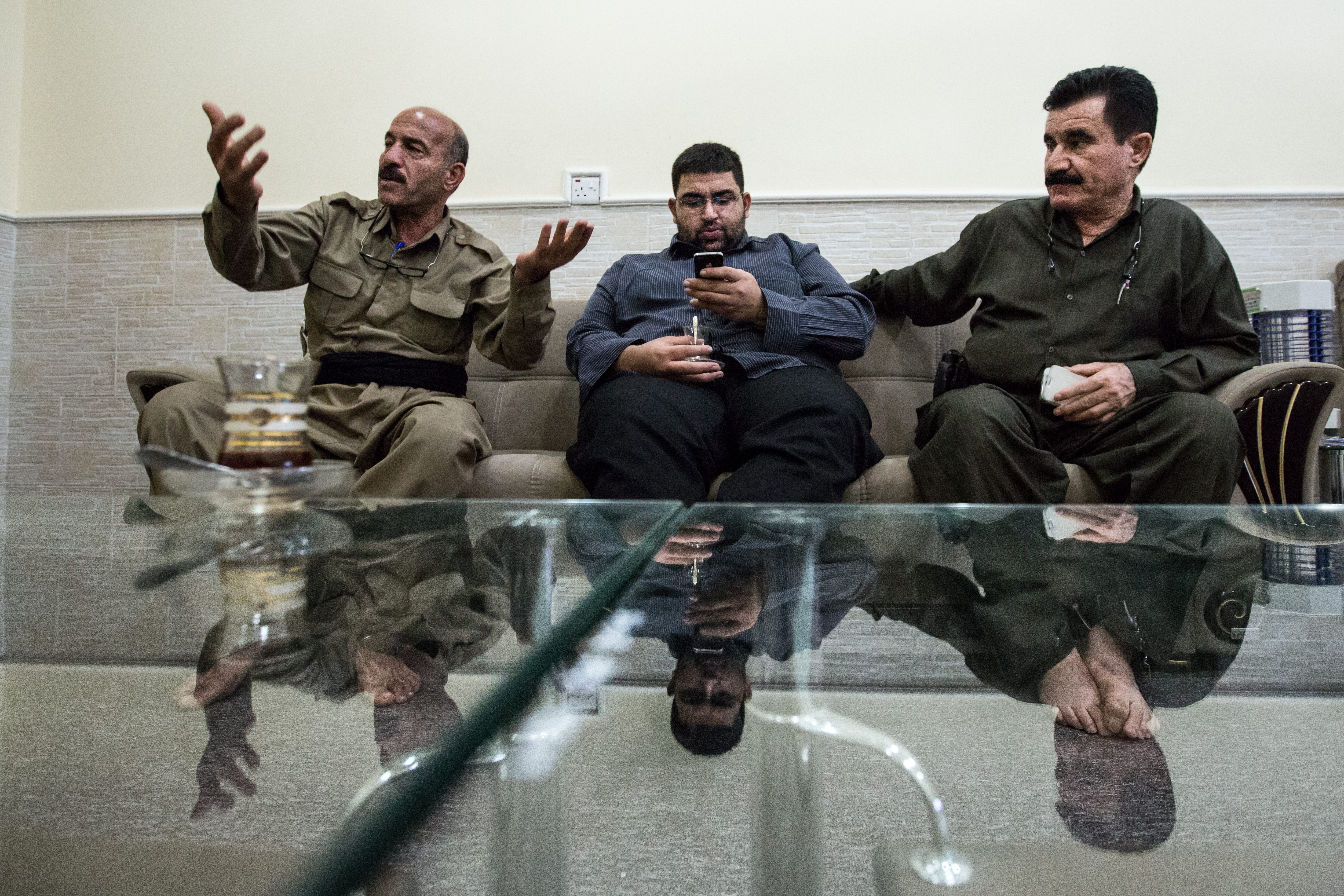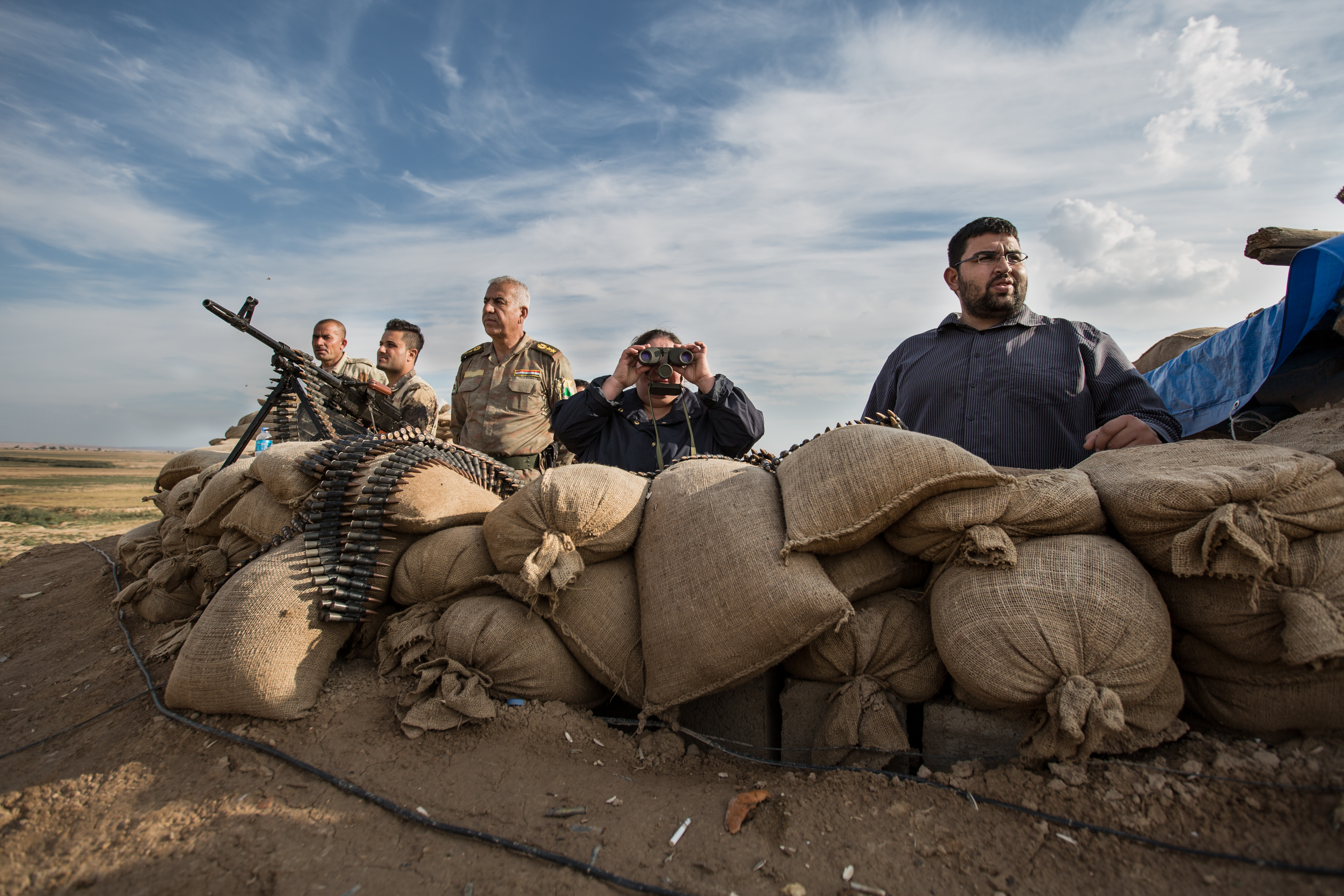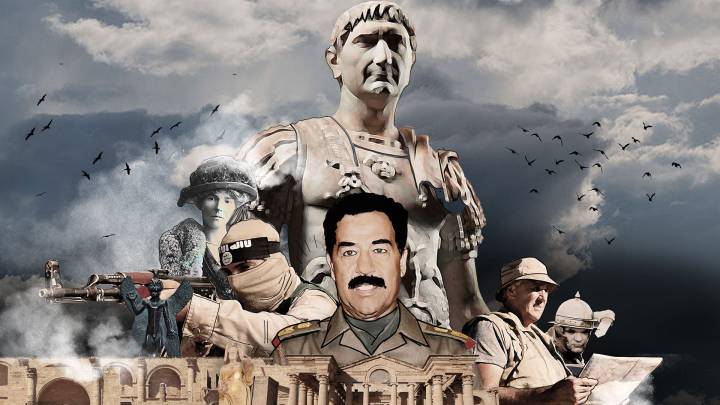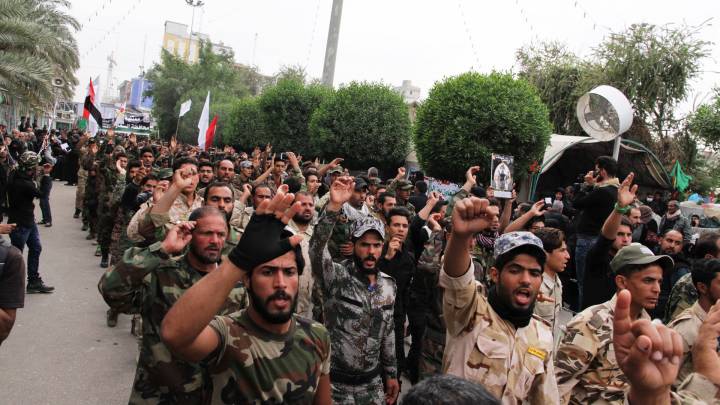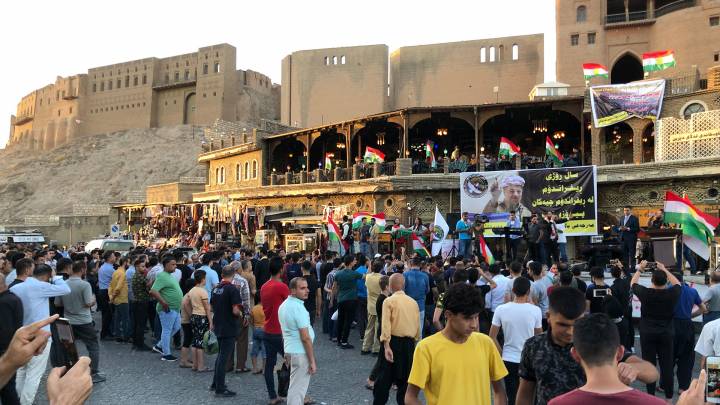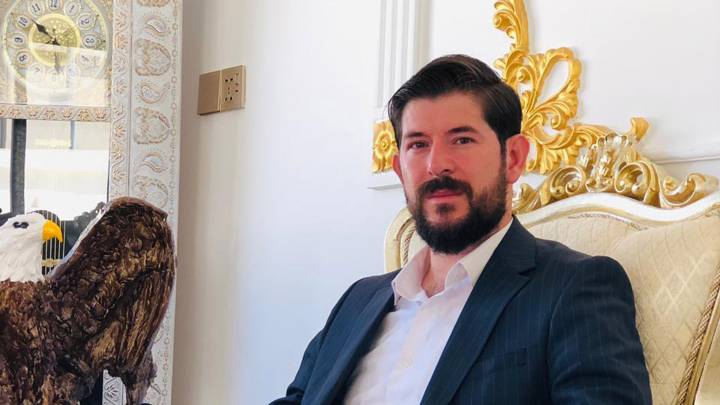A young Kurdish-German takes up arms against Daesh and for the liberation of Kurdistan. His mother, who also happens to be a war hero, goes with him. And that’s where the trouble begins.
It’s the day Kurdish Peshmerga forces from northern Iraq retake the city of Sinjar from the Islamic State (IS) or Daesh, advancing through devastated streets clogged with rubble and abandoned military trucks, alongside fighters from the PKK, the YPG and the Yezidi Sinjar Alliance. The fighters search for enemy stragglers and mines, moving between houses that have been flattened either by the retreating IS forces or by days of merciless US air strikes. Meanwhile, Kawa Prüfer is in the kitchen on a Peshmerga base, chasing blowflies around the room and trying to squash them with his hand.
Kawa Prüfer would have been happy to fight, against Daesh troops and for a united, free Kurdistan. That’s why he travelled to northern Iraq from his home in Karlsruhe, in southwest Germany. Just like he did last spring, when he was on the front lines – he claims for six months. Last autumn, the 29-year-old German Kurd decided to go to war again. But this time, things are not so simple.
This time, Kawa’s mother is with him.
“I won’t let you go again otherwise,” Majeda Prüfer told him. The 51-year-old has fought for Kurdistan herself, against Iraq and Saddam Hussein. In 1985, she fled northern Iraq with her then-husband and Kawa in her belly. After a long odyssey, she made it to Germany.
Mother and son have been on the road for two weeks now, in the territory officially known as the Kurdistan Region. It’s the nearest thing to a state that Kurdish people have, living divided as they do between Turkey, Syria, Iraq
and Iran. Kurdistan is easily reached –
there’s a direct flight from Munich to Sulaymaniyah, the second largest city. From there the journey continues in a rented black Toyota Land Cruiser, along straight roads
through the desert and narrow ones that
snake across the mountains. En route to –
well, to where exactly?
There is a lot of sitting on sofas eating and drinking tea. And there is a great deal of talking. But as for the war itself – Kawa Prüfer keeps missing it.“To the fighting at the front,” Kawa Prüfer keeps repeating. In fact, it’s never clear during the day where the car will stop in the evening. His mother decides the route on the spur of the moment from the passenger seat, engaged in a seemingly endless series of hectic phone calls. The drive then usually ends at the residence of an uncle or a cousin, of which there appear to be a generous distribution across northern Iraq. There is a lot of sitting on sofas eating, drinking tea. And there is a great deal of talking, especially about the war. But as for the war itself – Kawa Prüfer keeps missing it.
Stuck inside the Khanaqin base with the Karlsruhe blues again
Now he’s stuck in the base at Khanaqin, a city of 170,000 people, 500km southeast of Sinjar. In the kitchen, the bulky young man is like a caged, hungry bear. In fact, he has a job to do. He’s meant to be a bodyguard for Hamaraheem Jihaz, one of his mother’s old guerrilla warfare comrades, who everyone refers to by his first name only. In the new Kurdish quasi-state, Hamaraheem is a Peshmerga bigwig. He’s also base commander – and after breakfast, he disappeared.
“He’s probably at a briefing,” says Kawa, who spends the morning spitting out sunflower seed shells and watching Hollywood action movies on the flatscreen TV in the commander’s living room. Now and then he steps out to have a smoke. Below the right sleeve of his lightly-coloured button-up shirt, the greenish, thick letters of a tattoo shimmer on his forearm: KFFK – ‘Kurdistan Forever, Forever Kurdistan’.
After finishing the cigarette, he makes a gesture that’s become habitual over the last few days - he sticks his hands in the pockets of his camo pants and looks out into the ochre-coloured world. He stands there staring, civilian on top, uniform below.
While the West debates whether and how to wage war against Daesh, Kawa’s trying to do it here off his own bat, despite never having lived in Kurdistan and only knowing a few words of Kurdish. And it’s not entirely clear whether the Kurds want him here at all, or if his mother – who is something of a Kurdish national heroine – is helping his cause or instead keeping him away from the action. Kawa is her eldest, and she has two other sons and two daughters. Except for the eldest daughter, the whole family lives together in an apartment in Karlsruhe.
The Kurdish Kaiser of Karlsruhe
We meet the family for the first time in their home, on a sunny, late summer day in September. In front of the well-kept houses are new mid-size cars and bikes with child-safety seats. Nevertheless, Kawa feels responsible for the security of his visitors. While we’re parking, he comes up to the window and says, “Hey, you don’t have to lock your car here.” Every one in the neighbourhood knows that we’re his guests, so there’s nothing to worry about. On his block, Kawa is king, or at least thinks he is. In any case, he’s more or less the exact opposite of those pale, intimidated-looking sons of migrants that settled in rural Germany who you see posing in photos, off fighting for Daesh somewhere.
On his block, Kawa is king - or at least thinks he is.The apartment is spacious and modern, with almost exclusively white furniture. The only obviously exotic feature is the large collection of pictures of men with heavy black moustaches, many of them in military uniform. Kawa Prüfer has spent most of his life living here - he was born in Karlsruhe. After his parents separated, his mother moved with him to Portugal. There, she met a German man, with whom she had the other children. They eventually returned to Germany, first Berlin, then a village in Brandenburg, and finally in 1997, back to Karlsruhe. Later Majeda divorced her second husband. Both exes live in the same city. Kawa meets with his father sometimes, but never his stepfather. Nonetheless, he has kept his stepfather’s name, the integration process was smoother with Prüfer than with his mother’s maiden name, Rajab Wali.
Nonetheless, it was difficult. Kawa had to change schools repeatedly, he tells us in the spacious kitchen, reaching into a bowl full of ground beef and moulding kofta. Everywhere he went, he was an outsider; there was always a gap between him and most Germans. “I’m telling you how it is. We’re foreigners, with dark skin, dark eyes and black hair. And as Kurds, the German state considered us to be terrorists.” At school, when he was asked where he came from and he replied that he was Kurdish, “then it really started. ‘Ah, you don’t even have a country, you guys don’t even exist.’ On top of that, there were the assimilated AKP supporters, who would tell their children all kinds of stories about the Kurds. And then the next day, the children greet you with the Grey Wolves salute.”
We’re foreigners, with dark skin, dark eyes and black hair. And as Kurds, the German state considered us to be terrorists. Kawa Prüfer passed his school-leaving certificate by the skin of his teeth. He began an apprenticeship as a carpenter, but later dropped out. Then he entered a profession more suited to his stature, security and personal protection. He finished the training and began to practise his trade with Median Empire, a majority-Kurdish motorcycle gang, based in Cologne. On his other arm, the letters FEEF are tattooed in bold letters – ‘Forever Empire, Empire Forever’. The gang’s name refers to the empire of the Medes, which lasted between the eighth to the sixth century BC. Many Kurdish people see themselves as descendants of the Medes.
The Median Empire bikers claim they have nothing to do with prostitution, drug trafficking or other illicit activities. But they do control certain doors in Cologne, providing bouncers for nightclubs. Kawa recently broke off contact with the gang. “It’s for the best,” he says. It sounds like it wasn’t easy to say goodbye, and that not everyone would have succeeded in doing so. Now he’s minding his own business, which is not to say that he’s gone straight.
Majeda Prüfer walks into the kitchen, carrying a huge bag in one hand and an iPhone clamped to her ear in the other. She’s arranging an appointment with someone at the refugee coordination centre. She supplements her unemployment benefit by working as an interpreter.
As well as German and Kurdish, she can speak Arabic and Farsi, and there’s a lot of work for her these days. Finished with the phone call, she grins broadly at her son. “Surprise,” she says, opening the bag. It’s full of socks. Kawa can’t help laughing. “You’re completely insane,” he says. Giggling, his mother explains how yesterday Kawa and his 20-year-old brother were fighting over whose socks were whose.
Majeda's story
After her son leaves the kitchen, it’s not long before Majeda, a stout woman with mid-length hair and large black eyes, starts to tell her own story, of a world of war, deprivation and loss. Nevertheless, when she talks about it here in the heart of German stolidity and orderliness, her voice seems to be full of nostalgia for precisely that other, more dangerous world.
Majeda Prüfer’s family belongs to the influential Jaff clan, whose history can be traced back to the early 12th century. Between three and five million people in Iraq and Iran are of Jaff ancestry. Majeda was born in 1964, during one of the many wars for Kurdish independence in northern Iraq. Her parents’ union was an unusual one for Kurdistan - her father, Rajab Jaff, belonged to Khanaqin’s elites, while her mother’s family, the Badrai, are from a poor district.
Majeda Prüfer took part in the fighting, even as a young girl. “My father always told me I was his bravest warrior.” Rajab Jaff was a leader in the elite unit Peshmerga Derin, ‘deep Peshmerga’, which was constantly engaged in either open or guerrilla warfare against the Iraqi regime. Majeda Prüfer took part in the fighting, even as a young girl. “My father always told me I was his bravest warrior.” Disguised as a shepherd boy, she crossed the mountains on foot or by bike, to deliver messages, ammunition and explosives.
It was a dangerous job, she says, cutting the price tags off the socks and sorting them. Once, when she was 14 years old, Iraqi troops captured her and held her hostage, in an attempt to force her father to make contact and betray his comrades. But he remained resolute. She was abused repeatedly over several weeks, and almost starved; eventually the soldiers lost interest and abandoned her. Some time later, she joined her father’s unit, one of the very few women to fight in the Peshmerga. She is one of 17 children; two of her brothers were killed in the war. The first was a baby, shot by a sniper while he slept on his mother’s breast. Majeda saw the second hanging dead over a fence in Iraqi controlled territory. “Nobody could get his body home and give him a decent burial. For us that was the worst humiliation.”
The conversation in the kitchen is repeatedly interrupted by the ringing of Majeda’s mobile phone. The son of one of her cousins is seeking asylum in Germany, and arrived today. Now Majeda talks with his parents back in northern Iraq and the smugglers who brought him here, discussing what to do next. She tells us about her own escape. The journey began in 1985, when a piece of grenade shrapnel hit her in the right thigh. She couldn’t go to an Iraqi hospital, so she was taken to Iran; the Islamic republic was in the midst of its own war with Iraq, and supported the local Kurdish resistance.
For Majeda, her injury was her ticket out of endless war and suffering. After successful treatment, she and her husband were housed in a refugee camp in Iran. But life in a deeply-religious society, where women had little opportunity for advancement, didn’t suit Majeda, with her atheist and Marxist upbringing. All her family were members of the Patriotic Union of Kurdistan (PUK), the socialist-secular party founded in 1975 by Jalal Talabani, who went on to become president of Iraq.
Life in a deeply-religious society, where women had little opportunity for advancement, didn’t suit Majeda, with her atheist and Marxist upbringing. Majeda hoped to reach South Yemen, at that time the only country in the Middle East where women were more or less on an equal footing with men. Instead, an adventurous journey to the West began, which seemed to reach its end in Portugal. There, she bought a piece of land and developed it into a small farm. She met a German man, had a daughter and got married – “a spot of luck”.
Meanwhile for her family back home, living in a sort of concentration camp, things were getting worse. Finally, Majeda sold her house and farm and moved to Germany with her husband. With the money from the sale, she paid people smugglers and lawyers, and managed to move her parents and twelve surviving siblings and their families to the United States. In 1997, Majeda was able to settle down in sleepy Karlsruhe with her children.
Night has fallen. Majeda can’t reach the newly-arrived refugee. The Prüfer household is bustling. Kawa, his three siblings and five of his mates are there. Majeda still wants to make it to the supermarket to prepare for dinner, as well as stop by the train station beforehand to see if the new arrival is there waiting for her. One of Kawa’s friends takes her in his car. During the trip she’s constantly on the phone with Kawa. No one is waiting at the station. “Kawa’s going to be angry because it’s all taking so long,” she says.
Is Kawa the man of the house, then? He helps out in the kitchen, helps with cleaning the apartment, wakes up his youngest brother when it’s time for school. When the elder of his two brothers reacts indignantly to the request to set the table, Kawa says: “Listen, big guy, you’d better do it, or I’ll stick a knife between your eyes.” Absurd threats like this are part of his particular sense of humour. Still, you never know exactly whether he might be serious this time. It’s an ambiguity he takes obvious pleasure in.
The banter between mother and son occasionally resembles that of an old married couple. They have countless inside jokes. Kawa calls her “Mrs Hitler” and she replies, “Leave me alone, Mussolini.” Almost everything they do is either preceded or followed by a lengthy discussion. This generally ends in laughter, but sometimes it can devolve into a shouting match – which one it will be is impossible to predict. Kawa describes the relationship as follows: “The woman is a Leo. I’m an Aries. It totally clashes. She always thinks she’s right, and I’m so stubborn I could bash a wall down with my head.”
Everyone around the dinner table has an immigrant background. Other than Majeda, who now and then has to grope for a word and occasionally uses odd syntax, they all speak German perfectly. The topic for discussion is the extremely spicy sauce that Majeda has used. “It’s abuse,” says Kawa. “People have definitely died from this.”
“Not me,” replies Majeda
“But you’re a freak.”
“Excuse me?”
“Tastes good.”
“I know exactly what you said. I want everyone to hear what you said about me.”
“Please, Mama, if you’re going to box my ears, wash your hands first, otherwise it’ll be burning for the next six hours.”
That gets a big laugh. Later, Majeda finally gets in touch with her cousin’s son. He’s arrived near Nuremberg. She’ll pick him up by train in the morning.
Flight to Sulimaniyah
We visit the family again, in late October. It’s the evening before the flight to Sulaymaniyah, the second largest city in the Kurdistan Region, situated in the east of the semi-autonomous republic. Majeda has packed three suitcases with children’s clothes for cousins. Kawa is sitting on the floor of his childhood room, in front of a shelf lined with the books typical of any German children’s rooms: Astrid Lindgren, Michael Ende, Klaus Kordon. On the top shelf are five dolls Majeda has placed there, each symbolising one of her children. The one that represents Kawa is wearing a camouflage beanie. Kawa packs a bulletproof vest, a range finder and a night vision device into his bag. He plans to give the two electronic devices to his commanders as gifts.
The next day, going through security at Munich Airport, mother and son get into conversation with an elderly Kurdish man. Majeda asks him if he’s looking forward to being in Kurdistan. Certainly, the man replies, but points out that a lot of things could go wrong there, too. He feels more comfortable in Germany, where everything works. Here a visit to the swimming pool costs €3.50 whilst in Kurdistan, only rich families can go swimming, in their own private pools. Majeda’s tone immediately sharpens. “How dare you show so little pride in our country? I risked my life for freedom and now my son is doing the same thing, even though he’s never even lived there.”
On the plane, the man in the seat next to Kawa asks him what he does for a living. “I’m a soldier,” he replies. He mixes a vodka and tomato juice and starts to tell us about his first campaign the previous year. Kawa and his friends in the motorcycle gang had decided that they could no longer stand idly by while Daesh fighters in Syria and northern Iraq killed more and more Kurds. “They’re killing our brothers over there.” Along with a few other gang members, in spring 2014 he travelled into southern Turkey and the Kurdish areas in Syria.
In fact, he made headlines in Germany, as the ‘Cologne biker joining the fight against IS’. He can be seen in some of the blurred newspaper images. The first trip was more of a “humanitarian mission”, he says. They went into the devastated villages and the refugee camps and helped people in whatever way they could. “Then my hatred for those IS bastards just grew and grew.”
My hatred for those IS bastards just grew and grew Later, when one of his uncles was killed in battle with Daesh forces, it became clear to Kawa that he had to join the war himself. “Plenty of my friends asked me why I had to go and fight. They didn’t want to lose me. I think that’s selfish. If everyone saw it that way, no one would do anything, no one would fight, and then everyone would be killed.” What’s more, he’s not only fighting against Daesh, but also for the liberation of Kurdistan. “I’ll tell you how it is. We’re used to having people fight against us. Things will continue in exactly the same way, until we have a state. If we have our own country and our own borders and everything is officially on the map, no one can just come along and attack us any more.”
Kawa's fearless first foray to the front line
His first ‘deployment’ began with a version of basic training with the Peshmerga forces in northern Iraq, about nine months after the first trip with his biker friends. “There are a lot of people who come from abroad and want to fight against the IS,” Kawa says, including a number of poseurs. During the initial training, the Peshmerga try to work out who is really serious about fighting. Nobody tells you whether or not you’ve passed the test – if you fail, they just don’t pick you up from the base. “They had doubts about me too, because I’m a bit heavy. Then I showed them that I can do a two-metre high kick, and everything was okay.”
I always said I wanted to go all the way to the front lines. Where the fighting’s really hot, that’s where I want to be. The pickup truck came for Kawa and took him to the battlefront. He wasn’t paid, had daily watch duty, slept on carpets under plastic sheeting, subsisted almost solely on rice and beans, and was sometimes under bombardment for 14 hours at a stretch. He recounts all this with a serene air that is supposed to prove he’s a seasoned warhorse. He claims that none of it worried him. “I always said I wanted to go all the way to the front lines. Where the fighting’s really hot, that’s where I want to be.” No fear, really? “If it happens, it happens. You can also die sitting on the toilet.”
One morning, he recalls, he was eating breakfast with a comrade. One and a half hours later, the man took a bullet to the neck, which killed him instantly. “That was a shock, the first time I saw something like that. It’s not a game or a movie. You can’t press rewind and bring him back.” Has he killed anyone? Kawa doesn’t want to talk about that.
On other topics, though, he doesn’t hold anything back, including anecdotes that can only be believed with great difficulty. Like the time the German Federal Intelligence Service stopped him at the airport, interrogated him, and then tried to recruit him. Kawa has heard the story of his mother’s armed struggle countless times, and seen the veneration she receives in Kurdistan with his own eyes. Is he trying to hammer his own saga into shape with these trips to northern Iraq?
On our arrival in the Kurdistan Region, we immediately see the status Majeda Prüfer carries here. On the night drive from Sulaymaniyah to Khanaqin, we have to pass countless checkpoints. She always shows a card that identifies her as a member of the Peshmerga Derin. At each barricade and barbed wire gate, it works like an open sesame - the eyes of the guards light up and they all stand up a little straighter. And so it goes for the whole trip.
Often, the black Toyota is escorted by a military vehicle, and for certain parts of the trip Majeda has a personal body guard. With his beige suit, black shirt and snappy leather shoes, he’s a kind of Middle Eastern James Bond. Majeda obviously enjoys the attention. Sometimes she seems to want to get her ID card out even when it’s not absolutely necessary. “In Germany I’m a nobody, and here people are throwing themselves at my feet,” she says at one point. Her son never once has to reach for his own passport. He wouldn’t have gotten far without his mother, it seems.
It’s a chaotic journey through a state in chaos, criss-crossing barren, rocky landscapes on dusty roads, from Sulaymaniyah to Khanaqin, Khanaqin to Kirkuk, Kirkuk to Erbil, backtracking constantly. Nonetheless, it’s almost never monotonous. Kawa and Majeda make sure of that with their running dialogue, at times reminiscent of sketch comedy.
Kawa: “The guy in front of us has got a flat tyre, for sure.”
Majeda: “Oh really, I thought our tyre was flat.”
“Yeah, exactly, but we just keep driving.”
“Your brain is flat.”
“That’s because it was never blown up in the first place.”
Kawa sits in a room full of men who are all staring blankly into space. His face streams with tears. But as we doze off in the car, refuel, buy phone cards or bananas, we’re often no more than ten kilometres from Daesh-controlled territory. Ten kilometres that separate us from an unknown world, about which we haven’t the slightest notion. What we can see is how much suffering Daesh has inflicted on the Kurdistan Region. There’s the widow of Kawa’s uncle, sitting in her little cottage surrounded by other women in mourning garb, with simply no clue how to go on. There’s the refugee camp at Khanaqin where seven thousand people live in tents, and which the torrential rains of the first week of November have turned into one giant swamp of mud. And there’s the family of the Peshmerga fighter whose execution video Daesh posted on the Internet a day earlier.
When Majeda hears about this, she immediately commandeers two soldiers and a military truck to follow her to a local shop. Spending $330, she buys sacks of flour, rice and sugar and pallets of beans, which the soldiers load onto the truck. The small convoy drives to the fighter’s home village, where the residents are grieving, separated into rooms for men and women. Kawa sits in a room full of men who are all staring blankly into space. Kawa’s face streams with tears.
Even during the numerous visits to family, Majeda is treated like a star, whether in the spartan hut of her mother’s brother, or her father’s brother’s palace. Later, in Erbil, the capital, another uncle slaughters a sheep in Majeda’s honour. As the animal is dragged into the courtyard and its blood runs out into the street, it strikes us how strange this world, their place of origin, must have become to these two. While their hosts are arranging where the men are going to sleep so as to ensure that the women of the household will never have to enter the same room, Kawa says “You’ve really got to watch out, otherwise you’ll be married in no time.” His mother has bought a commode chair, because she finds the Arabic-style pit latrines embedded in the bathroom floor disgusting.
Sitting on sofas or mats in the traditionally-decorated living rooms of their relatives, Majeda talks constantly, while Kawa says very little. His Kurdish is just sufficient for small talk. Whenever children are around, though, his face brightens up and he plays with them lovingly, for long periods of time. One of his four-year-old cousins makes Kawa a bracelet out of rubber bands. He doesn’t take it off.
He frequently checks his mobile phone to see how his status updates are being received on Facebook. After his first deployment in Kurdistan, he had so many friend requests that he set up his own fan page. Facebook profiles can’t have more than 5,000 friends, the number of fans, however, is unlimited. Kawa keeps calling out the numbers. “Wow, this video has 480 views, even though it only shows the car!” The previous year, too, he posted numerous videos from the front to his Facebook. They show Kawa entering a re-conquered village and tearing the Daesh flag out of the ground, or sitting on the back of a pickup truck being interviewed for Kurdish television. The only thing not shown is actual combat.
Kawa frequently checks his mobile phone to see how his status updates are being received on Facebook. Then, while we’re in Khanaqin, drinking tea at the stately home of Majeda’s cousin Salar Nosieb Ali, he suddenly accosts Kawa. Everyone is proud of him, but does he really appreciate what he’s doing? He’s risking his life, but what does he hope to achieve? “You’re not even getting any money for this. But the generals, for whom you’re going to fight, wouldn’t lift a finger if they weren’t getting paid. Nor would they even think about sending their own children to war.”
Salar says that he too fought in the past, but then realised that only the politicians benefited from it. He built his house and his oil business himself, with no one’s help. He opens his jacket, revealing a holstered pistol. “I have to carry this, although I am a civilian. We want to live in peace, like you are able to in Germany. If you tell the influential people there what is going on in Kurdistan, you can achieve a lot more for our cause by peaceful means.” Kawa listens silently to Salar’s lecture, then goes outside for a smoke. “They must know that when they try to keep me away, it only makes me more determined,” he says. When mother and son are once again sitting in the car, the mood is tense.
Kawa: “Ma, I’m here to fight, you know that, that’s what we agreed on. But this – this is a family holiday.”
Majeda: “What do you think I’ve been organising the entire time then? I don’t mean to be insulting, but with the Peshmerga, you’ve got to earn their trust. The fact that they let you hang around here at all has nothing to do with them trusting you. It’s all because of me.”
“Okay, if you’re organising for me to go to the front, then that’s fine.”
“That’s exactly what I’m doing.”
Kawa tries - and tries again
Indeed, over the next days we drive around Khanaqin and between Khanaqin and Kirkuk, from one military encampment to the next. In the first camp, we’re greeted by Hamaraheem Jihaz, Majeda’s former comrade in arms. Kawa seizes the opportunity to demonstrate the rangefinder to him. Hamaraheem pays attention, but his gaze keeps sliding over to Majeda. Could it be that he’s doing her a favour?
The soldiers, noticeably few of whom are young, are barracked in stonewalled houses with tarpaulin roofs. Most of the houses are unoccupied, and inundated from the heavy rainfall. When we’re ready to drive on, one of the men on sentry duty knocks on the window of the car, and when we roll it down he starts talking at us loudly. He’s obviously heard that we’re journalists. “We haven’t been paid for months, we’re starving here. We’re giving our lives for the country. Just a week ago I was being shot at by the IS. And what are President Masoud Barzani and his cronies in the corrupt government doing? They’re sitting around on their piles of money and oil and doing nothing.”
We haven’t been paid for months, we’re starving here. We’re giving our lives for the country. In fact, for all the patriotic pathos displayed by almost every Kurdish person we meet, Kurdistan is most united in the fight against Daesh, and this unity is extremely fragile. Otherwise, northern Iraq is split fairly neatly between two factions, with the Kurdistan Democratic Party (KDP) ruling the northwest, and the Patriotic Union of Kurdistan (PUK) the southeast. This division is not along ideological lines, but rather a question of power and money. In the 1990s, the two parties were in open warfare against one another; these days they play out their rivalry by civil means. Still, both factions continue to maintain their own Peshmerga contingents.
Nevertheless, the various factional commanders all have very similar things to say about the progress of the war. In Dakuk, we meet General Tariq A. Ali, deputy commander of the local base and a KDP supporter. According to Ali, the fronts in northern Iraq have been consolidated after numerous areas were re-conquered during the past year. But in order to advance further, or attempt to retake the Daesh-occupied city of Mosul, the Peshmerga simply need more weapons.
While they are grateful for the support from abroad they have received so far, and especially from Germany, Daesh is still better equipped by a long way. We leave the Prüfers with the general and go for a stroll through the courtyard behind the barracks. There we find an apparently Western man, about 25 years old, who sits playing with a dog. When we introduce ourselves and ask him who he is, he says he doesn’t want to talk to journalists. What if he doesn’t have to mention his name? “All right.”
He’s tells us that he’s French and is there as part of an elite unit. Along with some other comrades, he decided to fight against Daesh off his own bat. They were in Syria before, and now he’s ended up here – and is frustrated. “People are always saying that there’s not enough weaponry. But that’s not the problem.” Far worse are the lack of structure and the rivalry between the different groups of fighters. “Before anything happens here, there’s always a discussion about who now belongs to the PUK or the KPD.” He says there’s almost no cooperation, and that sometimes he has the feeling the various groups would rather fight each other than side by side.
He even thinks the legendary fighting strength of the Peshmerga has been exaggerated. “They’re just bad, and usually they have no training at all. Out of all the soldiers, I guess you could say around ten per cent are good fighters.”
We drink a lot of tea, but they don’t let us go to the front. He also doesn’t think much of the other foreigners who have come to offer their support. “The majority of them are people who are total losers back home, and they come here wanting to play the war hero.” He’s often approached Peshmerga leadership with other elite forces and said, “‘Look, we know what we’re doing, let us go to work.’ Then they always thank us profusely and we drink a lot of tea, but they don’t let us go to the front.”
The next day, we drive to the front with Kawa and Majeda. We turn off from the main road onto a muddy dirt track. We pass completely-destroyed villages. We see one house where only the blue front door is left standing, as though it might open onto nothingness. Soon we can see the Peshmerga emplacement on the hill. When we’re about 200 metres away, the car can’t proceed any further, so we complete the final stretch by foot. Up on the hill, we are greeted by Colonel Fakrahden Havramy, a man with sparse white hair. He is head of the border guards, and commanded the unit where Kawa spent his first deployment. The Peshmerga position recalls images from the Second World War. It’s fortified with a wall of sand bags, on top of which there’s a machine gun mounted on a gun carriage. The soldiers’ cramped quarters are made of sandbags and blue plastic tarpaulins. A converted anti-aircraft gun serves as heavy artillery. Next to it is a cage with a chicken in it - lunch. Looking out to the left and right from this elevation, the long line of trenches is visible. Straight ahead, the Daesh positions can vaguely be seen. They’re two kilometres away. Nevertheless, Kurdish soldiers sit unprotected on the sandbag wall, dangling their legs.
General Fakrahden gathers his unit together and gives a speech. “Kawa, it’s an honour to have you here with us. You have a happy life, family and friends in Germany, and yet you come here to fight with us. We carry on the war for the whole world here, against an opponent who is better equipped than we are. But our people have bigger hearts, people like you, and that’s why we will win.” While he speaks, the colonel repeatedly looks over at Majeda, as if to ask, “Am I doing it right?” She is blushing. “I’ve got goosebumps all over my body,” she says.
The next few days revolve around the pending purchase of a Kalashnikov. On the way back, Kawa says he’s glad that the comrades have held their position. “But I want to be there, and not only as a visitor.” In order to fight, he will need to acquire a weapon. When we arrive in Erbil a few days later, Kawa makes contact with a German acquaintance, Heiko Seybold. Seybold, according to his own account, advises the Kurdish government “on security matters”. The meeting takes place in a hotel that has seen better days. Yes, Seybold says, he knows someone who can sell Kawa a Kalashnikov, officially of course, with registration and everything. It will cost $600. “Great,” says Kawa, and phones his mother. She arrives at the hotel and asks Seybold a series of professional questions - the weapon’s origins, its type and so forth. Once Seybold answers everything to her satisfaction, she says that it’s probably a good deal.
In the car on the way to see the arms dealer, Majeda tells Kawa that she has thought better of the transaction. “I can get you a much better weapon.” Kawa acquiesces. The meeting is cancelled.
The next few days revolve around the pending purchase of a Kalashnikov. But over and over again, people can’t be reached or they’re out of town or the price is too high, so the meetings Majeda arranges on the phone all fall through. The atmosphere during the long car trips is rapidly declining. Kawa is mostly silent, and only gives brusque, surly responses.
When we arrive once more at Salar’s house in Khanaqin, the dispute between mother and son escalates in his living room. They yell at one another for several minutes. Then Salar, who during the previous visit tried to talk Kawa out of fighting, stands up, leaves the room and returns, carrying a Kalashnikov. He can lend it to Kawa, he says. In a few seconds, the three-day battle between Kawa and Majeda is over. Kawa thanks Salar countless times, and also his mother, once she tells him that she has organised him a job as Hamaraheem’s bodyguard. To prepare, he strips the rifle and puts it back together numerous times.
Majeda arrives at the base, and without delay the two of them start screaming at each other. The job begins the very next day, at around the same time as the troops to the north are readying themselves for the assault on Sinjar. As one of 20 bodyguards, Kawa will accompany Hamaraheem on his visit with a UN delegation to Jalawla, a city reconquered from Daesh, which is now deserted. On the drive there, Kawa flips off the safety on the AK47. “I don’t know the territory around here and I don’t know what’s going on at the moment. So I want to be ready for anything.” In Jalawla, the delegation goes on a heavily-guarded promenade through the ruins. Kawa walks beside Hamaraheem the entire time, his right hand resting with casual emphasis on the stock of his rifle. The leaders demonstrate a booby trap. They have prepared a controlled explosion, which goes off with a deafening blast. Kawa is like a happy little boy.
He only hears about the attack on Sinjar the next day. Alone on the base, he becomes more and more restless. Finally, he asks us to call his mother and tell her that he’s going to drive to Sinjar, now. “If you guys talk to her, she won’t go berserk,“ he says. Or maybe he just doesn’t trust himself. An hour later Majeda arrives at the base, and without delay the two of them start screaming at each other.
Majeda: “It makes no sense whatsoever. No one will let us get in there.”
Kawa: “You say that, but I have connections, I can do it. I don’t give a damn whether you come with me or not.”
Majeda: “Fine, drive out there if you want to die. But before you do that, we give the gun back.”
We drive to Salar’s place. Kawa stays in the car while Majeda disappears into the house with the Kalashnikov. A short time later, both Salar’s and Majeda’s bodyguards come out. They begin talking at Kawa in Kurdish and gesturing vehemently. At one point Majeda’s bodyguard seems to be attempting to take Kawa’s passport from him. Kawa tears himself away, and the two bodyguards go back into the house. Half an hour goes by. Kawa yanks his bag out of the car and throws it to the ground.
Now he wants to get a taxi. A taxi to the war. He starts telephoning frantically, but can’t reach anyone. He paces back and forth. He smokes a lot of cigarettes. An hour goes by. “Right, I’m going to the road to flag down a car,” he says. A few minutes later Majeda comes out of the house, followed by her bodyguard. “Let’s drive.”
The mood in the car is relaxed. Kawa and Majeda resume their Hitler-Mussolini routine. After two hours of driving, we stop at a restaurant for dinner. While we sit at the table, the news starts to filter through that the struggle for Sinjar has been decided. Kawa’s demeanour vacillates between joy at the victory, and annoyance that once again he was not present. “Well, travelling there now doesn’t really make sense, does it,” he says. Majeda and her bodyguard look at each other with obvious relief.
146 people like this
On the drive back to Khanaqin, Kawa says that he might begin trying to focus on his life in Karlsruhe. “I’ve got to start building a future for myself sometime.” His mother, meanwhile, has fallen asleep.
Three days later, Majeda and Kawa Prüfer are on the plane back to Germany. Kawa has changed his Facebook profile picture to one of the photos from the winter of 2014, showing him in uniform on Kurdish television. 146 people like this. •
Constantin Wissmann works in Berlin as a freelance journalist, and writes for publications that include Die Zeit, Frankfurter Allgemeine Zeitung, Süddeutsche Zeitung and Neon. He already knew about hospitality in the Middle East, but found it particularly impressive in northern Iraq. One family served four fish, three half-chickens, numerous kebab skewers and side dishes for dinner – for just four people.
Sebastian Backhaus is a photojournalist specialising in life and politics in those countries in the Middle East affected by the emergence of Daesh. He started his career in photojournalism during the Arab Spring. His works have been published in German magazines Zeit, Stern, Süddeutsche Zeitung and VICE.
This article was first published in the 1/2016 edition of zenith
